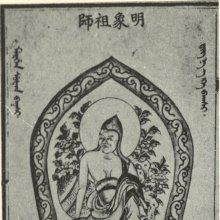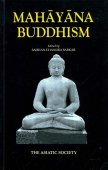Dinnaga, Dinnāga, Diṅnāga, Dish-naga: 13 definitions
Introduction:
Dinnaga means something in Hinduism, Sanskrit. If you want to know the exact meaning, history, etymology or English translation of this term then check out the descriptions on this page. Add your comment or reference to a book if you want to contribute to this summary article.
Images (photo gallery)
In Hinduism
Purana and Itihasa (epic history)
Source: archive.org: Personal and geographical names in the Gupta inscriptions (purana)Dinnāga (दिन्नाग).—The famous Buddhist dialectician Dinnāga came to Kāñcī to satisfy his intellectual and spiritual thirst and about the middle of the fourth century A.D.
Source: archive.org: Puranic EncyclopediaDiṅnāga (दिङ्नाग).—A Sanskrit dramatist who lived between the second and fifth centuries A.D. "Dhīranāga" was his other name. The Sanskrit drama "KUNDAMĀLĀ" which is based on Uttara Rāmāyaṇa and has six acts, was composed by Diṅnāga. Diṅnāga, the Buddhist preacher and this Diṅnāga are two different persons. Vināyakā and Śiva are praised in the introductory stanzas of Kundamālā (A.B. Keith: Classical Sanskrit literature).

The Purana (पुराण, purāṇas) refers to Sanskrit literature preserving ancient India’s vast cultural history, including historical legends, religious ceremonies, various arts and sciences. The eighteen mahapuranas total over 400,000 shlokas (metrical couplets) and date to at least several centuries BCE.
Languages of India and abroad
Sanskrit dictionary
Source: DDSA: The practical Sanskrit-English dictionaryDiṅnāga (दिङ्नाग).—
1) an elephant of the quarter of the compass; see दिग्गज (diggaja).
2) Name of a poet said to be a contemporary of Kālidāsa. (This interpretation is based on Mallinātha's gloss on diṅnāgānāṃ pathi pariharan sthūla- hastāvalepān Meghadūta 14; which is, however, very doubtful.)
Derivable forms: diṅnāgaḥ (दिङ्नागः).
Diṅnāga is a Sanskrit compound consisting of the terms diś and nāga (नाग).
Source: Cologne Digital Sanskrit Dictionaries: Edgerton Buddhist Hybrid Sanskrit DictionaryDiṅnāga (दिङ्नाग).—name of a teacher: Mahāvyutpatti 3481 (v.l. Dignāga; so Mironov with no v.l.).
Source: Cologne Digital Sanskrit Dictionaries: Shabda-Sagara Sanskrit-English DictionaryDiṅnāga (दिङ्नाग).—m.
(-gaḥ) An elephant of the quarter: see diggaja.
Source: Cologne Digital Sanskrit Dictionaries: Benfey Sanskrit-English DictionaryDiṅnāga (दिङ्नाग).—m. an elephant supposed to support a quarter of the world, [Meghadūta, (ed. Gildemeister.)] 14.
Diṅnāga is a Sanskrit compound consisting of the terms diś and nāga (नाग).
Source: Cologne Digital Sanskrit Dictionaries: Cappeller Sanskrit-English DictionaryDiṅnāga (दिङ्नाग).—[masculine] = dikkarin.
Source: Cologne Digital Sanskrit Dictionaries: Aufrecht Catalogus CatalogorumDiṅnāga (दिङ्नाग) as mentioned in Aufrecht’s Catalogus Catalogorum:—Quoted by Vācaspatimiśra Hall. p. 20. Mallinātha on Meghadūta 14 states that he was an opponent of Kālidāsa. He was the author of the buddhistic work Pramāṇasamuccaya. One verse is attributed to him in [Subhāshitāvali by Vallabhadeva] which however occurs in the Mahābhārata.
Source: Cologne Digital Sanskrit Dictionaries: Monier-Williams Sanskrit-English Dictionary1) Diṅnāga (दिङ्नाग):—[=diṅ-nāga] a etc. See under 2. diś.
2) [=diṅ-nāga] [from diṅ > diś] b m. = dik-karin, [Mahābhārata]
3) [v.s. ...] Name of a Buddh. author ([varia lectio] dig-n) etc.
Source: Cologne Digital Sanskrit Dictionaries: Yates Sanskrit-English DictionaryDiṅnāga (दिङ्नाग):—[diṅ-nāga] (gaḥ) 1. m. Elephant of any quarter; one of eight.
[Sanskrit to German]
Sanskrit, also spelled संस्कृतम् (saṃskṛtam), is an ancient language of India commonly seen as the grandmother of the Indo-European language family (even English!). Closely allied with Prakrit and Pali, Sanskrit is more exhaustive in both grammar and terms and has the most extensive collection of literature in the world, greatly surpassing its sister-languages Greek and Latin.
Kannada-English dictionary
Source: Alar: Kannada-English corpusDiṅnāga (ದಿಙ್ನಾಗ):—[noun] = ದಿಗ್ಗಜ - [diggaja -] 1.
Kannada is a Dravidian language (as opposed to the Indo-European language family) mainly spoken in the southwestern region of India.
See also (Relevant definitions)
Partial matches: Dish, Din, Naga, Tin.
Starts with: Tinnakam.
Full-text: Dignaga, Alambanapariksha, Dikkarin, Bauddhadarshana, Tinnakam, Yogacara, Apoha.
Relevant text
Search found 27 books and stories containing Dinnaga, Dinnāga, Diṅnāga, Dish-naga, Diś-nāga, Dis-naga, Din-naga, Diṅ-nāga, Dijnaga, Dijṅaga; (plurals include: Dinnagas, Dinnāgas, Diṅnāgas, nagas, nāgas, Dijnagas, Dijṅagas). You can also click to the full overview containing English textual excerpts. Below are direct links for the most relevant articles:
The validity of Anumana (inference) in Nyaya system (by Babu C. D)
A comparative study between Buddhism and Nyaya (by Roberta Pamio)
5.2. Diṅnāga’s definition of Perception < [Chapter 3 - The Buddhist Theory of Perception]
7. Classification of Perception (Introduction) < [Chapter 3 - The Buddhist Theory of Perception]
3. Ācārya Diṅnāga and His works < [Chapter 3 - The Buddhist Theory of Perception]
The Tattvasangraha [with commentary] (by Ganganatha Jha)
Verse 1235-1236 < [Chapter 17 - Examination of the Definition of Sense-perception]
Verse 1223 < [Chapter 17 - Examination of the Definition of Sense-perception]
Verse 273 < [Chapter 7 - Doctrine of the Self (ātman, ‘soul’)]
Vakyapadiya (study of the concept of Sentence) (by Sarath P. Nath)
6.1. Date of Bhartṛhari (The Philosopher Linguist) < [Chapter 1 - The Philosophy of Language: A Bhartṛharian Perspective]
4.3. Sentence-Meaning in Other Systems of Knowledge < [Chapter 2 - Perspectives on the Concept of Sentence]
2. The Concept of Pratibhā in Indian Philosophy < [Chapter 4 - The Concept of Pratibhā and its Implications]
Blue Annals (deb-ther sngon-po) (by George N. Roerich)
Chapter 4 - Pramāṇavārtika lineages < [Book 6 - The Origin of the Mādhyamika (middle way)]
Chapter 29 - Sonam Gyatso (iii): Ordination and early education < [Book 10 - The Kālacakra]
Philosophy of Charaka-samhita (by Asokan. G)
Perception (pratyakṣa) [in Charaka philosophy] < [Chapter 6 - Source of Knowledge (pramāṇa)]
Knowledge (pramāṇa) [in Charaka philosophy] < [Chapter 6 - Source of Knowledge (pramāṇa)]
Related products

